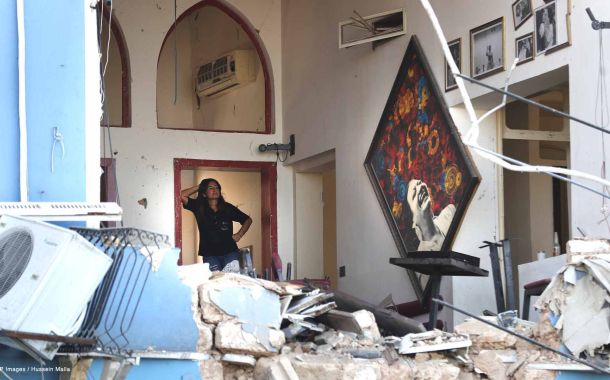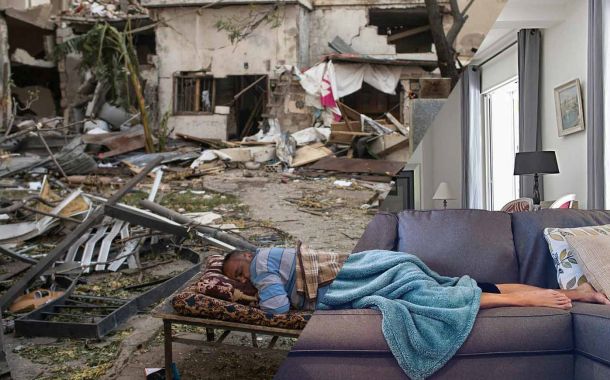Humanitarian Mission in Lebanon
In the wake of the tragic explosions that shook the port of Beirut on August 4, 2020, Professor Alain Brunet, in collaboration with Professor Sami Richa, Head of the Psychiatry Department at Hôtel-Dieu de France (Beirut), initiated a humanitarian project. These explosions resulted in an unprecedented disaster, causing the death of 190 people, injuring 6,500 others, and leaving 300,000 individuals homeless. Beyond the material damage, this catastrophe profoundly impacted the mental health of thousands, exacerbating the need for care for post-traumatic stress disorder (PTSD) in the region.

Furthermore, the project aimed to enhance the capacity to care for traumatized victims in Beirut by providing psychological support tailored to their needs. This initiative was part of a long-term perspective, aiming to rebuild the foundations of mental health in the region and promote individual and collective healing.
Alongside these training and intervention efforts, the project also integrated a research-action component. Under the guidance of Professors Brunet and Richa, the data collected by Lebanese therapists contributes to documenting and disseminating the results of this initiative, thereby informing clinical and therapeutic practices in the treatment of PTSD.
The humanitarian mission objectives
The objectives of the humanitarian project were to train and supervise one hundred Lebanese mental health professionals, including psychiatrists, psychologists, and nurses, in Reconsolidation Therapy™. This innovative therapeutic approach allows for the rapid and effective treatment of PTSD, thereby contributing to the resilience of the Lebanese people in the face of this unprecedented crisis.

Inspiration for the aid project in Lebanon
The humanitarian project in Beirut is also inspired by the success of the Paris Mission, coordinated by Professor Alain Brunet in partnership with the Paris AP-HP Hospital Network. This program trained 200 mental health professionals in 20 hospitals in Reconsolidation Therapy, providing vital support to victims of terrorism in Paris and in Nice in 2015 and 2016.
Achieved Results
In just a few months, 86 mental health professionals were trained and were able to care for numerous Lebanese patients suffering from PTSD after the harbour explosion. To promote knowledge dissemination and skill enhancement, a community of practice was set up for Lebanese therapists trained in Reconsolidation Therapy™, allowing for continuous sharing of experiences and best practices.
In summary, Professor Alain Brunet's humanitarian project in Beirut has established an urgent and efficient response to the humanitarian crisis that has struck the region. Through his commitment and expertise in PTSD, Professor Alain Brunet offers hope for healing and reconstruction to traumatized victims, thereby contributing to the resilience and recovery of the Lebanese community.
Alain Brunet
Testimonials


A novel therapy approach that gives us much hope.
« I would like to thank Professor Brunet. This training has been very enriching, thanks to the numerous exchanges with therapists from different specialties, coming from various parts of the world.
The therapy has given us a lot of hope because it is very easily applicable and will allow us to help many PTSD patients. Until now, the usual therapies we used took too long, and patients did not really feel any benefits. In contrast, Reconsolidation Therapy is brief, and the benefits are felt in just a few sessions. We will be able to treat a larger number of our people suffering from PTSD. »
Rima GEMAYEL ABI SALEH, Lebanese CBT Psychologist

Easy to learn and use
« This was a very interesting online training. It is truly accessible easy to learn, and quick to put to use. Six sessions are enough to help a person reduce the emotions triggered by trauma memories. It’s excellent; it’s new. I believe this therapy will allow people suffering from PTSD to quickly regain a relatively normal life. And the risk of relapse is low. »
Nathalie Richa, Doctor in clinical psychology - Behavioral and cognitive therapy

A mighty trauma therapy
« It was really a great opportunity for us to be present among the first group of trained Lebanese therapists after the harbour explosion. Until now, we didn't really have any specialized training to target trauma as such.
I think it’s an easy technique to learn and apply, very effective and which can really help us in the current situation. It is brief and does not require any complex equipment or facility. It requires very few resources to be able to get started and help people. Our goal is really to be able to help and effectively treat people in the field with this exciting technique... »
Elina Dirani, 3rd year intern in psychiatry